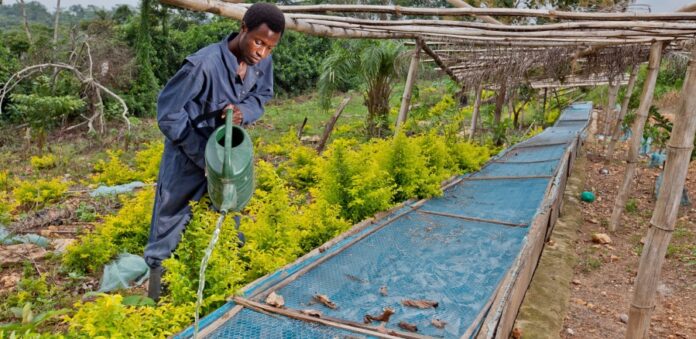A recent study by Okere, K. I., & Fasanya, I. O. (2024) titled “Technological Progress in Achieving Environmental Sustainability in Central and Southern Africa: The Role of fossil fuels and institutional quality” published Energy Sources, Part B: Economics, Planning, and Policy, shows that technological advancement can initially reduce carbon emissions due to cleaner technologies, but may later increase emissions due to factors like urbanization and reliance on fossil fuels.
“
Technological progress can initially reduce carbon emissions but may later increase them, influenced by fossil fuels and institutional quality.– Okere, K. I., & Fasanya, I. O. 2024
The article explores the relationship between technological progress and environmental sustainability in Central and Southern Africa, emphasizing the roles of fossil fuels and institutional quality. The study investigates how technological innovation impacts environmental sustainability, questioning the U-shaped relationship which suggests that technology initially reduces carbon emissions but may increase them over time due to factors like urbanization and energy-intensive technologies. The authors examines the influence of fossil fuels on the nexus between technological innovation and environmental sustainability, considering the carbon curse theory and the region’s reliance on fossil fuels for energy. The article explores the role of strong institutions in balancing the positive and negative effects of technology adoption on the environment, highlighting the differences between developed and developing countries in this regard. The study aims to provide empirical insights and policy directions for Central and Southern Africa, addressing gaps in previous research and offering a new perspective on the intersection of technology, fossil fuels, and institutional quality in relation to environmental sustainability.
How the Study was Conducted
The study utilizes data on energy mix from IRENA 2021 and employs a distinctive measure of technological progress (medium- and high-tech manufacturing value-added) to assess technological advancement over time. The authors apply the Jackknife causality test technique proposed by Juodis, Karavias, and Sarafidis (2021) to decipher causal directions among the variables. The research investigates the relationship between technological progress and environmental sustainability, considering the role of fossil fuels and institutional quality in Central and Southern Africa.
What the Authors Found
The authors found that technological advancement can initially reduce carbon emissions due to cleaner technologies but may later increase emissions due to factors like urbanization and reliance on fossil fuels. The study highlights the “carbon curse” theory, suggesting that reliance on fossil fuels can hinder the transition to clean energy and contribute to environmental degradation. The authors also found strong institutional frameworks in developed nations help mitigate the negative environmental impacts of technology. However, in the Global South, weak institutions fail to direct finance towards green-compliant technologies, leading to adverse effects.
Why is this Important
Environmental Impact: Understanding the relationship between technological progress and environmental sustainability is crucial. As technology evolves, its impact on the environment becomes more pronounced. By identifying the tipping point at which technological advancement either benefits or harms the environment, policymakers can make informed decisions.
Policy Implications: Policymakers can use these findings to design effective policies. For instance, promoting cleaner technologies during the early stages of technological progress can help mitigate environmental damage. Additionally, addressing institutional weaknesses in developing countries can foster sustainable technology adoption.
Global Context: The study’s focus on Central and Southern Africa sheds light on a region with unique challenges. It highlights the need for tailored strategies that consider local contexts, energy sources, and institutional frameworks. These insights can inform global efforts toward sustainable development.
Long-Term Planning: As we strive for a greener future, understanding the interplay between technology, fossil fuels, and institutions is essential. Long-term planning requires balancing economic growth with environmental protection, and this research contributes to that balance.
What the Authors Recommend
- Policymakers should encourage the adoption of cleaner technologies during the early stages of technological progress. By doing so, they can mitigate environmental damage and reduce carbon emissions. This proactive approach ensures that technology benefits the environment rather than harming it.
- In developing countries, weak institutions often fail to direct financial resources toward green-compliant technologies. The authors recommend strengthening institutional frameworks to facilitate sustainable technology adoption. This includes promoting policies that incentivize environmentally friendly practices.
- Long-term planning requires striking a balance between economic growth and environmental protection. The authors suggest that policymakers should consider the impact of technology on the environment and design policies that promote sustainable development. This involves collaboration between governments, industries, and civil society.
In conclusion, the study by Okere and Fasanya offers critical insights into the complex relationship between technological progress and environmental sustainability in Central and Southern Africa. By highlighting the dual potential of technology to both reduce and increase carbon emissions, the authors underscore the importance of strong institutional frameworks and proactive policy measures. As the region grapples with urbanization and a reliance on fossil fuels, the findings emphasize the urgent need for tailored strategies that promote cleaner technologies and sustainable development. Strengthening institutional quality and fostering international collaboration are pivotal steps toward balancing economic growth with environmental protection, ensuring a greener and more sustainable future for the region.
















 The African Research (AR) Index is a comprehensive scholarly directory and database focused explicitly on journal publishers that publish and disseminate African research.
The African Research (AR) Index is a comprehensive scholarly directory and database focused explicitly on journal publishers that publish and disseminate African research.

